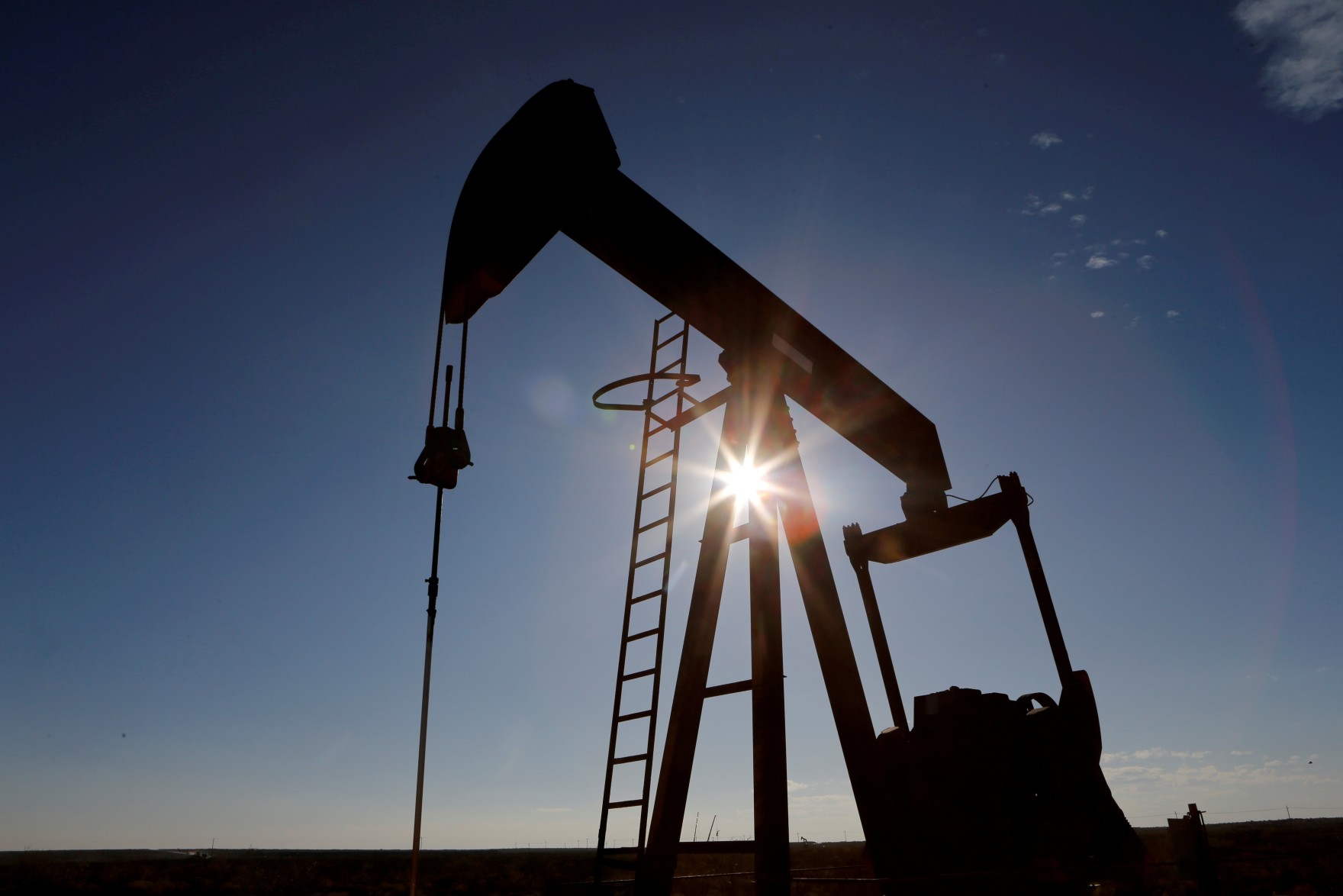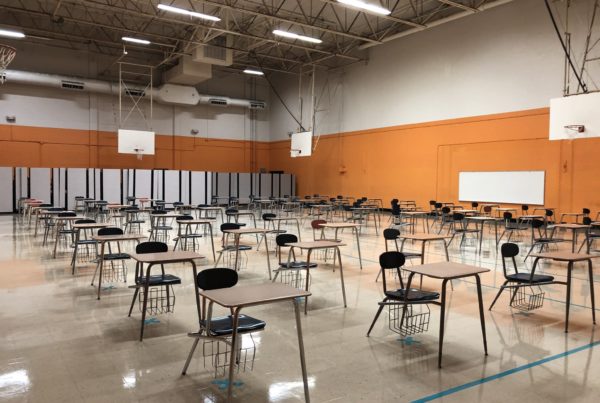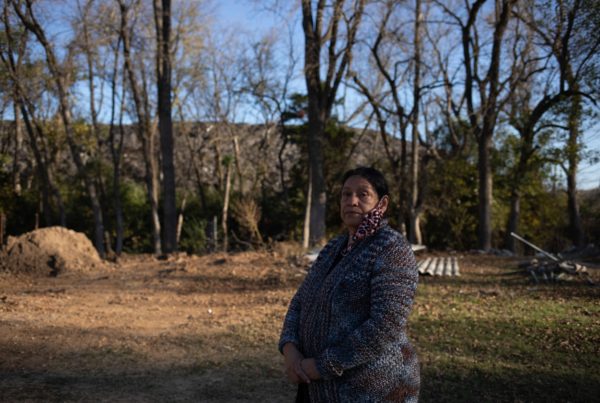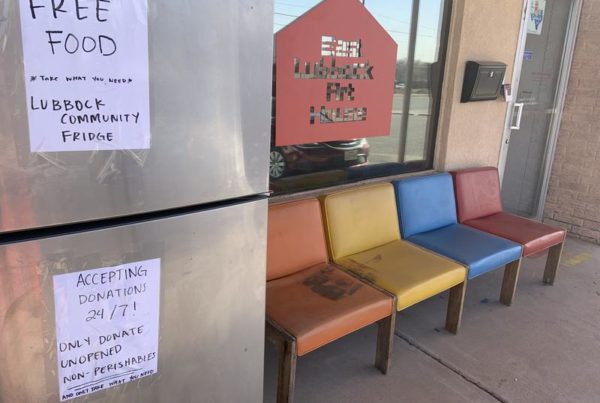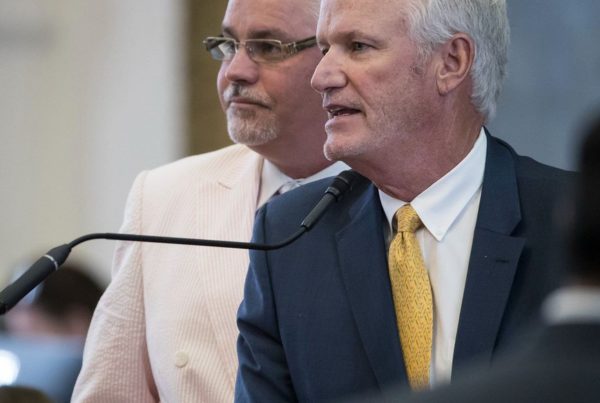From TPR:
Brody Pinkerton walked through the rig yard at Maverick Well Pluggers in Midland, Texas. The 32-year-old rattled off a list of fixes as wind whipped between the giant machines sitting side by side in his company’s lot.
“That engine is done, done,” he said before explaining to a reporter the steps they will need to take before this machine is ready to go back into the field. He points to another and rattles off a handful of other issues, including a busted radiator.
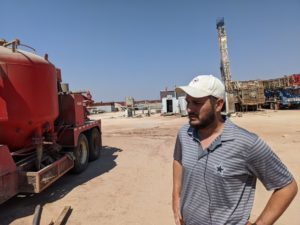
Brody Pinkterton walks the rig yard at Maverick Well Pluggers.
These workover rigs are usually used to fix temperamental oil wells.
A 40-foot-long behemoth drives out to a well and raises its 96-foot derrick. It can remove or replace old pipe, or do whatever needs to be done to get the oil flowing.
Not at Maverick though.
Maverick is the hospice care of oil wells. They pull the plug. More accurately, they are the plug — for unproductive or orphaned wells. Maverick pumps thousands of pounds of cement thousands of feet underground. This is supposed to make the wells safe and protect nearby water supplies.
And the fact that more than half the company’s rigs are sitting idle in this lot is a good indicator of how bad business is.
“All the maintenance would have really happened out in the field. You’d use it until it broke and then you’d have to fix it out in the field,” said Pinkerton, who owns Maverick with his father and a third partner.
But the entire oil industry has been in trouble for the past eight months.
And if oil is in trouble, that means Texas is, too.
Right now the price of oil is a third less than it was in January. Every dollar the price drops, experts say, represents a decline of about $85 million in economic impact in the state. By many estimates, the speed and severity of this bust make it the worst on record.
Around the country, American oil fields have shed more than 107,000 jobs since the COVID-19 pandemic began. About one-third of those jobs were in the Permian Basin. Texas accounts for more than half of the nation’s oilfield layoffs, according to the Petroleum Equipment & Services Association.
The rig count, or number of active oil rigs producing, is a barometer of the industry. The Permian Basin, which encompasses much of Maverick’s work footprint and the cities at the heart of the region — Midland and Odessa — went from more than 450 rigs to fewer than 130 in a matter of weeks. Estimates are that about a hundred jobs go along with each rig. And the number of new well permit applications has dropped by half.
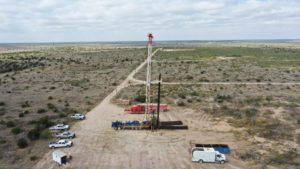
A workover rig from an aerial view.
Midland and Odessa make up the hub of the Permian, the most productive oil region in the country and the epicenter of the current oil collapse.
The two cities are two sides of the industry. The white-collar oil production and exploration jobs are largely located in Midland; the oilfield service jobs are often held by a blue collar Odessa workforce.
The pain from the current downturn is felt across the state, but especially in communities like these, that rely on the oil industry. And it’s felt in the smaller oilfield service companies located here, like Maverick.
Brody Pinkerton said for the past seven months, he feels like his company has been squeezed, by bigger companies struggling to cut costs.
“They were sending essentially demand letters of, ‘If you want to do work for us moving forward. You’re going to submit new prices with at least 25% (reduction). We’d really like to see 30% reduction,’” he said
“And I’m calling and saying look, ‘We don’t make 30% profit on this stuff.’ And it was kind of like, ‘well, figure it out.’”
There are more than 6,000 orphaned wells by the state’s count, and historically low activity in the oil fields. On its face, it looks like a great time to plug wells, and a great time for a company like Pinkerton’s. But as big oil producers slash expenses, plugging wells is one easy place to delay work, or shift more of the cost to companies like Maverick.
Business is so bad that Brody Pinkerton, his father and a third owner haven’t paid themselves in five months. They had to lay off more than half their 50 employees.
And 2020 was supposed to be a big year for them.
“It was gonna be a knockout year, honestly. We were building, upgrading,” Pinkerton said, referencing a new environmental reclamation service Maverick had started offering.
But it was clear early on 2020 was going to be rough.
The year began with a war over oil production between Russia and OPEC. Both wanted the other to cut their production rate. Instead they both ramped it up. It was the highest spike in 30 years. The excess oil was more than Spain, Japan, France, Germany consumed daily, combined. Oil prices plummeted.
At the same time demand was imploding because of COVID-19. About 90% of the U.S. was under a stay-at-home order, and China was in full lockdown. Lots of ships weren’t transporting things, airline flights decreased by two-thirds, people hunkered down and didn’t drive. For a brief time, oil was unnecessary.
And that’s when the market did something it had never done before: The price of oil dropped below zero.
Oil companies with no demand for their product were paying people to take it off their hands. The price of oil eventually reached negative $37 a barrel.
“I’ll never forget that day. I screenshotted it when it went negative,” said Pinkerton. “I just never thought I’d see anything like that.”
That night, he was sitting around a friend’s backyard with others who all worked in oil in some way. They drank beer and commiserated.
“All you can do is laugh,” he recalled. “It’s like, ‘What are we all going to do?’”
At one point, Maverick had just one rig working. Now — seven months later — they are up to six rigs. But they are still making less money.
Pinkerton hopes it will get better, but the company’s bills are still coming in and when they call on customers they hear a familiar phrase: Call me after the first of the year.
Pinkerton is optimistic Maverick will make it, but if things don’t change after the first of the year, or if it gets worse, he doesn’t know what will happen.
“It’s really stressful being an owner-operator. It’s like I said, Maverick’s always been good about being a family. I mean, we’ve got some guys who have been here forever,” he said. “I mean, they’re family.”
And Maverick is just one of hundreds of service companies that dot the landscape of Midland-Odessa. And the whole region relies on this industry doing well.
A Familiar Story
Drew McManigle is familiar with what Pinkerton has been going through. His family used to be in the oil business, but not anymore.
His father started the Devonian Well Service company in the 1950s. The Odessa service company had 12 to 15 workover rigs. Everyone knew the family; his brother would go on to become mayor of nearby Midland.
The 1980s started out pretty promising for them.
“I was in my mid 20s, at the time. And, you know, the early ‘80s had been somewhat of a boom, and business was ginning right along,” said McManigle.
The price of oil hit a record high in 1980, $39.50 — which would have been over $109 dollars a barrel today. The record pegged to inflation would stand for nearly 30 years. People were making money. The oil industry was so lavish and posh, the melodrama Dallas was one of the the most popular show on TV.
But then it stopped. The price of oil, spurred by a massive glut of production, fell to less than $10 a barrel.
“Our family’s business went through Chapter 11,” McManigle said.
No one had seen a bust like that in a generation, and it didn’t end at oil producers and service companies. Oil is expensive; it needs loans to survive and those loans weren’t going to be repaid.
“Over the course of time, I think over 640 Texas banks closed. Banks closed all over the country,” McManigle recalled. “One of the largest independent banks in the country at the time, Continental Illinois, in Chicago folded primarily because of its oil and gas portfolio. So, it really did turn the industry upside down.”
People lost their fortunes. Banks foreclosed and sold off equipment in auctions.
The McManigle family business was over. But more than 30 years later the memories remain. Drew said he can remember specific days and hours. Like When Gulf Oil drove rates of contracts so low a service company like theirs couldn’t make any money, or when he got a call from a competitor telling him the bank had closed. There was a payroll due that afternoon that they weren’t able to make.
“It is horrendously stressful, and it’s unrelenting. Because there simply aren’t very good answers,” said McManigle. “Nine times out of 10 the decisions are totally and completely out of your control.”
Companies have no say in production rates of competitors, of OPEC or of demand swings.
“Sometimes unfortunately, the solution is that there’s not a solution. And the only thing you can do is… close the business and call it a day,” said McManigle.
The ‘80s drove people like him out of the oil industry, and out of Odessa. The bust also drove banks and capital away from the region. The communities that rely on oil suffered for decades. They had never seen anything like it.
Until maybe now, said McManigle:
“This downturn is going to make the downturn of the ‘80s look like a cakewalk. When it’s all over and done.”
Communities Relying On Oil Struggle
Renee Earls is the head of the Odessa Chamber of Commerce and said oil and gas is the life blood of the region.
“Out here in Odessa, the Permian Basin, no matter what industry you’re in, we’re all in the oil industry,” she said, adding that busts aren’t new in Odessa.
“We’re very used to booms and busts here. And I think this one’s a little bit different. Because we were told by an economist — we were told by virtually everyone — that this was a boom, that was lasting a bit longer than any of us expected, decades.”
That matters because everyone from the chamber and its business members to city leaders have been making plans based on those estimates.
The boom caused a lot of demand for housing. That was starting to change. After decades of having no real investment, the area has new housing coming in. The city partnered on a new hotel and meeting center downtown.
But now the demand that made this one of the most expensive places to rent a room or an apartment is largely gone. There are several projects being built right now in the area.
“There are going to be a lot of empty apartments,” said Kirk Edwards, president of Latigo Petroleum and a business leader in Odessa.
“It’s sad to see all the people making these investments in our community because it took forever for people to come back and invest in Midland Odessa,” said Edwards.
After the bust of the ‘80s, people fled the oil industry and the area, taking their dollars with them. Home prices in the area were depressed for decades, by one analysis remaining 44% below their 1983 values through 2006.
Fewer people means less business, a problem already occurring for restaurants like The Barn Door in Odessa. Owner Roy Gillean says they are already struggling with COVID.
“Because of all the COVID stuff we were down last month. We were down to 37% from what we did last year, but that just walking in the restaurant — that doesn’t include our catering. And our catering, we did another 25% so we’re down quite a bit,” said Gillean
He and his team would often pack up a mobile grill and drive it to an oil well to feed the crew.
“We would drive 100 miles and go out into an oil field. And charge by the mile, of course, and go out there and maybe cook steaks on our trailer (for them)” he said. “And you know, they’re away from their families. When they see us show up, it’s kind of a morale booster, and all of that has gone away.”
They’re making a lot less now. But he, like so many in this community, has a West Texas stoicism about the whole thing.
“The ups and downs don’t surprise us a whole lot,” said Jason Berridge, CEO of Complex Community Federal Credit Union.
“I mean, that’s part of being out in the oil economy, you know, it’s gonna go up, and you make hay while the sun shines, but it’s just gonna go back down,” said Berridge. “You got to get ready when it’s down; to start making hay again when it comes back up.”
So, while the experts and analysts and media are freaking out, West Texas residents just hoped they put enough away in savings to last.
Berridge knows from experience. His father had been a pilot for an oil company when the ‘80s bust hit. His father, out-of-work, would travel hundreds of miles to do any job to put food on the table. This was on his mind as the credit union began working with members to make ends meet. He estimates more than 70% of them work in oil. The credit union began deferring payments for car loans for interested members. Now 2200 loans or $60 million in loans have taken advantage of the program that can go as long as three months.
“We’re hearing day in and day out, people are still struggling, the jobs are slowly starting to pick back up, and they’re starting to get their regular hours back. They’re not working in overtime situations yet. But they’re still struggling. People are, you know, trying to decide to put food on the table or pay their bills,“ he said.
Workers with an area charity reported only being able to help one out of every three people who need help paying rent or utilities.
Can It Be As Bad As The 1980s?
Some questions when looking at a place like Odessa in 2020 are: can most of these companies hold on long enough until recovery? Are oil and gas jobs coming back in the medium term?
Can it get as bad as the ‘80s?
“It’s the worst one. It’s, it’s different than all the others. The speed with which it’s this happened earlier in the year is unlike anything we’ve seen before,” said Garrett Golding, an economist for the Federal Reserve Bank of Dallas.
“Obviously, it can’t get any worse than negative oil prices.”
And that is scaring away the money.
The advent of hydraulic fracturing in oil and gas a little over a decade ago led to new oil in Texas and elsewhere, sometimes in places they oil producers thought were exhausted.
The so-called “shale revolution” turned an old, dusty, moderate-return industry into something exciting, technologically innovative — and therefore potentially lucrative. Stock in public companies like Exxon soared. Private investors pounced.
“The shale revolution was not financed by debt, it was financed by equity, for the most part,” said Gary Sernovitz, an author and energy finance veteran of 25 years.
Equity investors were chasing big returns, but were met with what one analyst called a capital destroying machine.
“For the last 10 years, investing in the energy portion of the S&P 500, you’ve lost half your money. In everything else you would have tripled your money.”
Sernovitz added the only way oil companies get more investment at this point is if they essentially revert back to the old steady dividend-paying sure bets of the 1990s.
Drew McGanigle, the former oil man, is now in corporate restructuring. He thinks the major companies like Chevron, BP, Shell and others can last through this. In fact a number of them have merged and bought one another to gird themselves for what’s next.
“It takes a lot of money to be in the oil and gas business. It takes a ton of money to be in the energy service business,” McGanigle said. “Everything costs a lot of money, the rigs cost a lot of money, the tools cost a lot of money.”
The money won’t be there. Which means more bankruptcies. There have been more than 90 bankruptcies among oil producers and companies that service them this year, according to Haynes Boone, a law firm that tracks the industry. There were more bankruptcies in a single 2020 quarter than all of 2019.
And McGanigle’s firm is expecting the bankruptcy numbers to stay high through next year.
“The only people who can survive it long term are the major oil companies, the major service companies. You’re seeing probably the death knell of the independent oil man, as we’ve known him over the last 60 or 100 years,” he said.
And until the oil price picks up and exploration ramps back up, we won’t see those jobs return.
What’s Next?
The election of Joe Biden was not what oil executives who spoke to TPR were hoping would happen. President-elect Biden has talked about banning fracking on public lands. This doesn’t impact Texas directly, as the state is more than 90% privately owned, but it adds uncertainty, as does the lack of a concession from Biden’s predecessor.
That said, the Permian Basin is still the most productive and cheapest place to produce oil in the U.S. When America’s oil industry recovers, it’s likely Odessa and Midland will recover their production jobs first.
“The Permian will recover, and will be an important part of the global oil supply going forward. But for many other parts of the U.S. gas business, it does feel like the coffin maker, as you know, it already had the first nail in and a couple more have been added during this one,” said Gary Sernovitz, author and investor.
But all signs are that the community will suffer for some time to come as oil has plateaued a one-third less its value in January. And the era of free and easy capital is likely over for the foreseeable future in oil, increasing those bankruptcies.
Oil stocks jumped by more than 10% the day a successful vaccine test was announced. Certainly, the view from West Texas was that the sooner people get back to flying and driving the better … but the country as a whole has learned one thing that the people of Odessa and Midland and the oil industry has known for a long time: Sometimes you have no say.


